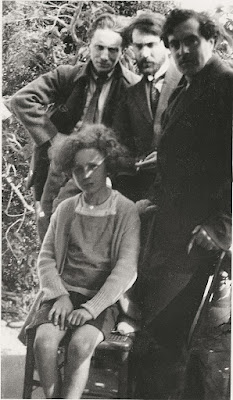THE ASSASSINATION OF JESSE JAMES BY THE COWARD ROBERT FORD
'The Assassination of Jesse James by the coward Robert Ford' (starring Brad Pitt, Casey Affleck) attempts to poeticise the torpid life of racist psycho (or Southern rebel) Jesse James, but is really a study in celebrity culture, the psychopathology of 'leaders'. The film details the latter part of Jesse's career as his family and other gang members are gradually whittled away, leaving only Jesse, his brother Frank and the dregs of criminality they gather around themselves from local small towns and villages. Jesse is gunned down by Robert Ford while dusting a photo, standing on a chair, a very vulnerable position, (perhaps Jesse was more famous for his housekeeping and general household role than for his gunslinging? This suggests a feminine role for Jesse, a way to breach his defences and ultimately to destroy him.) so its clear that Jesse trusted Robert Ford and his brother Charley implicitly. But he clearly misjudged the situation, a sign that his powers of mind and grit were waning. The nature of trust, judgement and mis-judgement are important themes in this film.
Afterwards Robert and Charley tour the country, performing onstage Jesse's last moments, but gradually the tone of Robert's reception turns to derision, the applause fades away. For a time (the film tells us) Robert Ford was more famous than the President, viewing Jesse's corpse similar to viewing the Taj Mahal or the Pyramids, ie a world-shattering event. The film's a brilliant study in the critical reception of a historical event, very unlike any other Western I've seen, for it's intellectual, reflective, mythopoeic. An intensely slow, anguished character development rather than a series of entirely visceral moments, although these are also prevalent, the film insists on tempting the viewer to regard the kernel of Jesse's personality and nature as it is foreclosed or finished.
This film undoubtedly expands the language of film, emphasizing the contrasts between attempts to document Jesse's life with the then newish technology of photography, Jesse becomes a star of celluloid but only in death. It also breathes new life into the Western genre itself (of course but this is hardly being mentioned anymore as it once was, the Western genre manages once again to prolong its death agonies.). However, its obviously difficult to poeticise a character like Jesse, who, as the film tells us, is clearly a demented racist psycho. This may be the rock on which the film flounders. But not really. (Robert Ford was assassinated in his turn by an Irishman O'Kelley whose sentence was commuted as a result of 'illness', although its certain that the Governor was happy to see all his problems killing each other off. The cycle of violence seemed to finish there.) The problem with this film is that its clearly over-long, could be trimmed by 40 minutes, especially the postscript which doesnt add enough to justify a further 30 or so minutes of running time.
This seems to be Brad Pitt's best performance.
It seems that the recurring Western myth of Jesse James and his gang is bound to be re-evoked every decade or two, surely reflecting the concerns and preoccupations current.
Paul Murphy, London
Afterwards Robert and Charley tour the country, performing onstage Jesse's last moments, but gradually the tone of Robert's reception turns to derision, the applause fades away. For a time (the film tells us) Robert Ford was more famous than the President, viewing Jesse's corpse similar to viewing the Taj Mahal or the Pyramids, ie a world-shattering event. The film's a brilliant study in the critical reception of a historical event, very unlike any other Western I've seen, for it's intellectual, reflective, mythopoeic. An intensely slow, anguished character development rather than a series of entirely visceral moments, although these are also prevalent, the film insists on tempting the viewer to regard the kernel of Jesse's personality and nature as it is foreclosed or finished.
This film undoubtedly expands the language of film, emphasizing the contrasts between attempts to document Jesse's life with the then newish technology of photography, Jesse becomes a star of celluloid but only in death. It also breathes new life into the Western genre itself (of course but this is hardly being mentioned anymore as it once was, the Western genre manages once again to prolong its death agonies.). However, its obviously difficult to poeticise a character like Jesse, who, as the film tells us, is clearly a demented racist psycho. This may be the rock on which the film flounders. But not really. (Robert Ford was assassinated in his turn by an Irishman O'Kelley whose sentence was commuted as a result of 'illness', although its certain that the Governor was happy to see all his problems killing each other off. The cycle of violence seemed to finish there.) The problem with this film is that its clearly over-long, could be trimmed by 40 minutes, especially the postscript which doesnt add enough to justify a further 30 or so minutes of running time.
This seems to be Brad Pitt's best performance.
It seems that the recurring Western myth of Jesse James and his gang is bound to be re-evoked every decade or two, surely reflecting the concerns and preoccupations current.
Paul Murphy, London

Comments